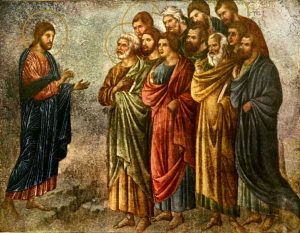We have numerous blog posts on this topic and I encourage anyone type in the search button to find posts regarding St Teresa and the Interior Castle. This blog serves as a brief introduction to the famous work. Written in 1588, St Teresa wished to help souls find their way to God. The Castle serves as a metaphor of the interior soul and the mansions are the various rooms within the castle. The duty of the soul is to know God more perfectly entering more deeply into the castle. God is always present in the castle and near, but the soul must overcome the trials, distractions and sin of the world to find God. Many never find the ultimate mansion until the next life, and even so, this union is imperfect due to temporal reality, but it is the closest taste of Heaven possible for souls who do complete such saintly levels on earth.

Most human beings of good nature may struggle through the first 3 mansions, and few may enter into the 4th and 5th. We should all strive though our very best to become as close to God as possible. St Teresa illustrates the soul as a silk worm who must eventually build its own cocoon to become a beautiful butterfly. The longer it crawls, the longer it must wait to become re-born. For those who never enter into the mansions, they are paralyzed by sin, hypnotized by the illusions of the world.
The soul must acknowledge the presence of God, its own imperfections, seek forgiveness and enter into prayer and meditation to enter the first mansion. The first three mansions are purgative in that they break the soul of earthly attachments. Many spend their life teetering between mansions. Falling back and forth to the world and then back to God.
The First Mansion is an invitation to prayer. It is an acknowledgement of sin and one’s own true self. It forces one to accept humility in one’s state before the throne of God. The soul though is tempted by many worldly things. In fact, as the soul advances, it is barraged more and more by the enemy in an attempt to prevent spiritual growth.
In the Second Mansion, the soul has grown in holiness. It prays, it seeks good company and holier books and things regarding the faith. It pushes the soul to seek God in times of tribulation due to the constant warfare waged by the enemy. In active mental prayer, the soul seeks God. It looks to withdraw oneself from outward senses and look inside towards God.
In the Third Mansion, the soul has overcome many of the initial difficulties of change. The soul sincerely wishes not offend God but is not ready to fully surrender to the will of God. The soul must overcome aridity and perceived absences of God’s presence. The soul is tried and pushed to greater limits to see God through pure love not necessarily a warm presence.
The Fourth Mansion invites the soul to illumination and perception of greater mysteries. The soul enters into a prayer that is passive in recollection. This pure gift from God presents itself and the soul involuntarily closes off to the world. In addition of the Prayer of the Quiet, the soul experiences more peace. Unlike active recollection in prayer which is like a aqueduct to the ocean, passive recollection is with the source of the ocean itself. It is with the Divine. The soul has opened itself to these gifts.
The Fifth Mansion continues the love for the Divine in prayer. The Prayer of Union pushes the soul further from the world and makes it fall asleep to it. The soul appears to withdraw from the body. In this deeper love, the soul seeks greater penance. The soul, as the analogy of silk worm, begins to create its cocoon and seeks a deeper union.
The Sixth Mansion can be likened to Engagement to the Divine. The soul is deeply in love and shares with God deep raptures, visions, locutions, flights of spirit, ecstasies and tears of separation in this fallen world from the Divine. However with this deeper union comes equal trials of persecution, illness, and hardships.
Final union occurs in the Seventh Mansion. In this mansion, the soul has awoken to the true reality of God. There is a spiritual marriage between the soul and the Divine. The soul ceases to experience aridity, but only a tender love for God and neighbor. Crosses exist and are welcomed, but they cease to unsettle the soul. The soul loses fear and experiences a peace of constant presence of the Divine. The soul however despites its great desire to pass into the Beatific Vision, accepts it place on earth and shares the love of the Divine with one’s neighbor.
Christ’s human nature experienced a perfect union with the Divine infusion of the Blessed Trinity via the Son. However of course, although two natures, there was one Person in the Hypostatic Union and this union was complete from the moment of the conception of Christ. The Blessed Virgin Mary also experienced this deep union, not merely through grace but the Incarnation itself, and her womb being a vessel of the Divine itself.
Most Christian Counselors will deal with individuals struggling with the first three mansions, especially the first. Christian Counselors can help individuals find greater union with God by mapping the path set by St Teresa and helping individuals deal with the trials they will experience as they go deeper into union with God
Please also review AIHCP’s Christian Counseling Certification and see if it meets your academic and professional goals. The program is online and independent study and open to qualified professionals seeking a four year certification as a Christian Counselor.










